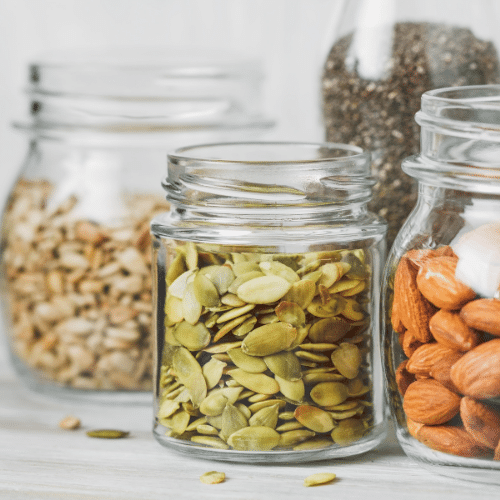15 Natural Ways To Balance Hormones After 40
Are you in your 40s or 50s and feeling sluggish, depressed, or just not like yourself? Have you gained weight, or are you having issues sleeping? If you’re having these problems, there’s a good chance it’s because of a hormone imbalance.
Table of Contents
ToggleIt’s true that women are expected to have a hormone imbalance related to perimenopause as a normal part of life. However, this imbalance can be worsened by life stressors and unhealthy nutrition and lifestyle habits.
Fortunately, there are natural ways to balance hormones that can help improve your energy levels, minimize those menopause symptoms, and improve your overall well-being.
In this article, we’ll discuss 15 of the best natural ways to balance hormones.
Natural Ways to Balance Hormones
The best way to maintain hormone balance is through a combination of a healthy diet, regular exercise, and stress-reducing activities.
In addition, adding certain supplements and herbs to your diet can help rebalance hormones naturally.
Eat Enough Protein

Eating a well-balanced diet rich in protein is essential, as this nutrient, in particular, significantly contributes to the regulation of body chemicals.
Firstly, protein can help regulate the hormones that control hunger.
For example, a high-protein breakfast regulates your hunger hormone better than one that is high in carbohydrates. The ideal breakfast is well-balanced and includes quality sources of protein.
But, this is true for all meals, so it follows that protein is also important in all your meals. It’s found in many foods, including eggs, poultry, beef, fish, beans and other legumes, soy products, milk, and dairy products. It’s also present in smaller amounts in quinoa and green leafy vegetables like spinach, asparagus, and broccoli.
Moreover, a study found that eating vegetable protein, equivalent to 3-4 servings per day, was associated with a lower incidence of early menopause in women.
How Much Protein Do You Need?
It depends on many different things, but a good rule of thumb is to eat between 25 and 30 grams of protein in every meal.
Keep in mind that if you exercise strenuously, you will need a little bit more to achieve the same benefits.
Eat Healthy Fats
Healthy fats can help manage the hormones related to insulin resistance, appetite, and hunger.
They are also known to reduce menopause-related anxiety in women.

Interestingly, a review study concluded that there was insufficient data to support the theory that omega-3 supplements reduce hot flashes or improve sleep quality and quality of life during the menopausal period. However, it did find that these fatty acids might reduce night sweats.
Examples of good fats include olive oil, coconut oil, avocados, avocado oil, fatty fish, nuts and seeds.
Eat Fruit and Vegetables
Diets high in fruit and vegetables can help the body to produce more of its own estrogen.
This benefits you because estrogen and progesterone are the two hormones that decline in menopause.
Manage Your Weight
Your weight influences the hormones that send signals to your brain that you’re hungry or full; studies show that overweight and obese people are more sensitive to the other hunger-inducing effects of ghrelin, the hunger hormone.
Managing your weight can also affect the balance of your hormones by suppressing estrogen-related conditions and promoting healthy progesterone levels.
Recent research shows that obese women have higher concentrations of free estradiol and free testosterone, which places them at higher risk for certain diseases, including depression.
It’s better to lose weight slowly through diet and exercise rather than crash diets or other drastic methods. It is all about being gentle with yourself.
Drink Enough Water

Water is exceptionally beneficial for balancing your hormones; not only does it hydrate your body, but it also contributes to keeping you feeling good.
By drinking enough water, you will reduce bloating and constipation by ensuring that the food you eat is properly digested and absorbed into your bloodstream.
Limit Caffeine
Regularly drinking caffeinated beverages such as coffee, tea, or soda can trigger cortisol secretion.
An imbalance of cortisol levels contributes to weight gain, high blood pressure, muscle weakness, mood swings, anxiety, depression, irritability, and disruption of the sleep/wake cycle.
Therefore, it’s vital that women control the amount of caffeine they consume daily if they are having issues sleeping. What’s more, caffeine may worsen insomnia that you may already experiencing secondary to perimenopausal or menopause.
Decreasing your caffeine intake can also help alleviate hot flashes associated with menopause.
Limit Alcohol
The stress hormone cortisol increases in your body with alcohol intake, while the sensitivity of estrogen receptors to estradiol is reduced.
That means that too much alcohol may worsen any hot flashes or night sweats that you might be already experiencing, which will exacerbate insomnia caused by perimenopause or menopause.
Alcohol also worsens sleep quality, resulting in frequent awakenings and incomplete sleep restoration.
It’s also important to note that alcoholic drinks contain a high amount of calories and carbohydrates, making weight management more difficult. One single glass of wine a day can provide over 50,000 calories a year!
Eat Less High-Sugar Food
Food that is high in added sugar has an impact on hormone balance because it raises insulin levels in the body. That makes it harder for women to lose weight while increasing their risk of developing type 2 diabetes.
Furthermore, insulin affects other hormones, including sex hormones.
Too much sugar builds up and contributes to the hormone imbalance associated with hot flashes, fatigue, difficulty concentrating, weight gain, and other wonderful symptoms associated with perimenopause and menopause.
Unfortunately, after the age of 40, it’s harder to manage a diet high in sugar and simple carbohydrates, like white flour, pizza, cookies, and other sweets.
Move More
Regular exercise can help balance cortisol. This is important because having too much cortisol can cause sleep, memory, and anxiety problems, while too little could put you at risk of depression.
Exercising regularly has also been shown to improve insulin sensitivity, which supports healthy hormone levels, amongst other benefits such as increased energy, muscle strength, and an improved outlook on life.
If you feel too fatigued for exercise, try yoga or stretching instead until you feel more energetic; then consider other exercise types when you feel more able. Have confidence in your abilities and trust that you will get there.
The recommendation is to exercise most days of the week, including strength training, aerobic, and flexibility exercises.
In fact, exercise is one of the best natural ways to balance hormones and enjoy a great quality of life!
To increase the amount of exercise you do without it feeling like a chore, try taking small steps to move more through the day.
Get Some Sun

As many as 80% of US adults are deficient in Vitamin D. Your body produces Vitamin D from exposure to sunlight on your skin or you can eat foods high in vitamin D.
To get vitamin D from sunshine, try to spend at least 20 minutes outside in the sun each day. If possible, wear short sleeves to maximize your exposure.
Not a bad way to balance your hormones, right?
Foods high in vitamin D include fatty fish, eggs, and fortified milk.
You may also want to consider taking a Vitamin D supplement at 1000 to 4000 IU per day.
Of course, it’s always ideal to have your vitamin D level measured before taking supplements. Luckily that measurement is now a pretty standard test ordered by physicians when they’re seeing outpatients.
Take Probiotics
A healthy gut can help regulate your appetite and boost your metabolism so that you can burn calories more effectively.
You can easily get the probiotics you need to improve your gut microbiome by eating foods that are high in probiotics or taking a supplement.
Foods high in probiotics include sauerkraut, kimchi, yogurt with live and active cultures, kefir, and tempeh.
Take a Deep Breath
Natural ways to balance hormones for menopause should include relaxation techniques that help us control our emotions, as women most commonly complain of mood swings during this time.
Hormone imbalance is worsened by having too much of the stress hormone cortisol and not enough of the DHEA hormone. This can make you feel anxious or upset and even result in tearfulness.
Conscious deep breathing is an effective way to reduce cortisol in the body and boost serotonin. Lowering stress hormones will help support the hormonal health of the female body in an organic way.
A good night’s sleep is also key to decreasing chronic stress levels.
Prioritize Sleep

A good sleep/wake cycle plays a major role in hormone balance. Melatonin and cortisol levels should be stable while the adrenal glands are rested and reset each day.
Sleeping well can help decrease the common morning anxiety that is caused by an excessive surge of cortisol in the morning.
Poor sleep habits can even change how your brain reacts to junk food and sugar, leading to cravings for carb-based food throughout the day.
Furthermore, lack of sleep will change the hormones that regulate your appetite and fullness.
To make things worse, lack of sleep can also trigger the adrenal glands to secrete more cortisol, leading to a stress belly or fat accumulation around the stomach.
Finally, lack of sleep changes the body’s glucose metabolism and increases the amount of insulin produced, making you feel hungrier. As a result, you eat more, making weight loss more difficult.
So, as you can see, sleeping is one of the best natural ways to balance hormones. Click here to find out more about how sleeping well is the key to good health and the steps you can take to improve your sleep.
Try Adaptogenic Herbs
Herbs and vitamins can be a great way to help reduce hot flashes without resorting to artificial supplements. What’s more, natural hormones like adaptogens can do amazing things for your body.
The term adaptogen is fairly new to Western medicine but has been used in Asian countries for centuries. An adaptogen is a substance that can help your body cope with stress.
Adaptogens work by helping regulate the various functions of your endocrine system and immune system. Aside from managing cortisol levels, some of these herbs also promote well-balanced estrogen and testosterone levels.
Adaptogenic herbs include maca, ashwagandha, holy basil, and Asian ginseng.
Smile More
Happiness is the antidote to stress, and—believe it or not—it’s a choice you can make. When you can control your thoughts and choose to feel good, your hormones are positively affected. This, in turn, helps your body balance itself naturally.

Happiness is the antidote to stress, and—believe it or not—it’s a choice you can make. When you can control your thoughts and choose to feel good, your hormones are positively affected. This, in turn, helps your body balance itself naturally.
Symptoms of Hormonal Imbalance
Hormone imbalances occur when there is a deficiency or excess of hormones in your body.
Because of the essential role of hormones, side effects from an imbalance can significantly affect the quality of your life.
Among many other functions, hormones regulate:
- Metabolism and appetite
- Sleep cycle
- Reproductive cycle and sexual function
- Blood sugar
- Mood and stress level
Thus, a hormone imbalance can result in:
- Increased risk of disease
- Difficulties sleeping
- Weight gain or loss
- Craving for specific foods
- Chronic pain and headaches
- Mental health problems like anxiety, stress, and depression
The Bottom Line
Perimenopause and menopause create a hormonal imbalance. It’s hard to believe it, but more than half of all women over 40 live with hormonal imbalances. This can lead to a variety of symptoms, including weight gain, fatigue, depression, and pain.
Fortunately, there are lots of natural ways to balance your hormones after 40! Even better, these lifestyle changes will also help improve your overall health.
Last, there are many safe and effective supplements to help you balance your hormones.
The good news is that you are in control of your health and the quality of life you want to live.

Dr. Su-Nui Escobar, a Registered Dietitian/Nutritionist in Miami, FL, is dedicated to empowering women in perimenopause and menopause to live healthier, more satisfying lives.
With a doctorate in clinical nutrition from the University of North Florida, she has expertise in menopause and weight loss, including the unique challenges faced by those on weight loss medications.
Su-Nui’s passion for her field is evident in her previous role as the Academy of Nutrition and Dietetics spokesperson.


